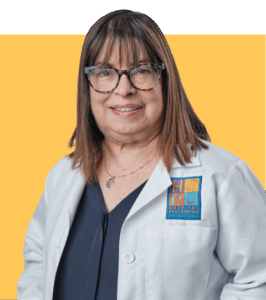CHILD NEUROLOGY SECTION
OVERVIEW
Child Neurology Section
Marisel Vázquez Correa, MD
Associate Professor
Section Chair
Department of Pediatrics
School of Medicine
University of Puerto Rico
Tel – 787-756-4020
The Child Neurology Section is a comprehensive, recognized section and program in Puerto Rico, organized under the Pediatrics Department of the School of Medicine of the University of Puerto Rico (UPR). Since 2007, it has provided comprehensive health care to children of all ages requiring diagnosis and treatment of neurologic diseases and disorders. This section has an experienced faculty staff that provides excellent quality health care, neurological evaluation, accurate diagnosis, innovative treatment and careful follow-through. As part of the UPR School of Medicine, its faculty also provides teaching to medical students and residents in different specialties and sub-specialties. The active teaching of interns and residents during their clinical rotation through the Section as well as lectures scheduled within the Residency Training Program, provide a continuum of the nervous system functions and diseases and their treatment options.
Clinical Services
The Child Neurology Section is committed to provide care to neonates, infants, children, and adolescents with diverse neurologic conditions, like Epilepsy, CNS infections, Brain tumors, Headache, Neonatal Neurologic complications, Demyelinating disorders, Degenerative disorders, Autism, Developmental delay, ADHD , and many others. We provide inpatient consultation services and outpatient services.
Inpatient services are provided 24 hours, 7 days a week at the University Pediatric Hospital Dr. Antonio Ortiz, a Tertiary Care Hospital located in the Puerto Rico Medical Center, devoted to care of sick children with the most complex health conditions.
Outpatient services are provided in three clinics a week, where all Child neurology residents and rotating residents participate, under the supervision of the Child Neurology faculty. Services include dedicated specialized clinics in epilepsy, neuromuscular diseases, headache, demyelinating disease, developmental disorder and delay, stroke, attention deficit disorders, among other neurological conditions.
Research Program
Our members have been involved in diverse clinical research projects and in mentoring research projects by residents of the Child Neurology Training Program and graduate students from the University of Puerto Rico School of Public Health-Administration Department. All residents are required to become involved in a project during their three years of training, under the mentorship of a member of the faculty.
Training Program
The mission of the child neurology training program is to provide the intellectual environment for acquiring knowledge, diagnostic skills and clinical judgment that are essential for the independent clinical practice of child neurology.
The program is committed to further the development of the subspecialty of child neurology, to provide excellence in the care of the pediatric patients in Puerto Rico and to conduct, coordinate, and evaluate educational training programs at graduate and postgraduate levels.
Since its foundation in 2005, this ACGME accredited training program has successfully graduated 13 Child Neurology Physicians, all Board Certified in the specialty.
Contact:
Mayela Díaz, M.D.
Child Neurology Training Program Director
e-mail: mayela.diaz@upr.edu
CLINICAL SERVICES
Child Neurology Service
Marisel Vazquez, MD
Associate Professor
Section Chair
Department of Pediatrics
School of Medicine
University of Puerto Rico
Tel – 787-756-4020
Email – marisel.vazquez1@upr.edu
Clinical Services
The Child Neurology Section provides care to children with diverse neurologic conditions. Our board-certified faculty provide inpatient and outpatient consultation in the University Pediatric Hospital, Dr. Antonio Ortiz, a Tertiary Care Hospital located in the Puerto Rico Medical Center, devoted to care of sick children with the most complex health conditions, and at three different outpatient clinics.
Conditions treated include:
- Attention Deficit Disorders
- Autism
- Brain Malformations
- Cerebral Palsy
- CNS infectious diseases
- Developmental Delay
- Disorder of Metabolism
- Epilepsy
- Fetal/neonatal neurology
- Headache/Migraine
- Learning disorders
- Motor delays
- Muscular dystrophy
- Movement disorders
- Multiple sclerosis and other demyelinating conditions
- Neuromuscular disorders
- Neurogenetic disorders
- Sleep disorders
- Spinal muscular atrophy
- Stroke
- Tics
- Tuberous sclerosis
Inpatient: Inpatient services are provided at the University Pediatric Hospital Dr. Antonio Ortiz in Puerto Rico Medical Center, and is the main tertiary health center of P.R.
Outpatient: Services are provided in clinics held 3 times a week. There are three main clinic sites:
Pediatric epilepsy clinic– at the University Pediatric Hospital. This is the only pediatric epilepsy clinic on the Island specialized for the evaluation and care of complicated children with epilepsy.
Faculty: Dr. Miriam Rios Motta- Epileptologist, Dr. Janice Rodríguez, Pediatric Epileptologist
Location: University Pediatric Hospital-3rd floor- clinic area
Day: Mondays AM
Phone: 787-474-0333, ext. 7286, 7431
Pediatric Neurology Clinic
Faculty -Dr. Janice Rodríguez, Dr. Alexandra Montalvo, and Dr. Mayela Díaz
Location San Juan City Hospital, in PR Medical Center.
Day: once a week in AM
Phone: 787-480-2805
Contact: Clinic secretary
Child Neurology Continuity Clinic
Faculty: All Child Neurology Faculty and residents
Location: Medical Science Campus- Intramural Practice –“Reparto Metropolitano” -second floor –Pediatric area
Day: Thursdays AM
Phone: 787-758-7910 (extensions 210, 212,275)
Contact: Clinic secretary
Child Neurology Faculty
Office Address:
Hospital Dr. Antonio Ortiz
Pediatric Department,
Call Box 191079, San Juan, PR 00919-1079
Phone: 787-756-4020
Marisel Vázquez, M.D.
Academic Rank: Assistant Professor
Child Neurology Section
Chair
School of Medicine, University of Puerto Rico
Administrative title – Chief Neurology Section
marisel.vazquez1@upr.edu
Mayela Díaz, M.D.
Academic Rank: Assistant Professor
Child Neurology Section
Program Director
School of Medicine, University of Puerto Rico
Administrative title- Child Neurology Training Program Director
mayela.diaz@upr.edu
Miriam Ríos Motta, M.S., M.D.
Academic Rank: Assistant Professor
Child Neurology Section
Neurophysiology and Epilepsy subspecialty
School of Medicine, University of Puerto Rico
miriam.rios@upr.edu
Janice Rodríguez, M.D.
Academic Rank: Assistant Professor
Child Neurology Section
Pediatric Epilepsy subspecialty
School of Medicine, University of Puerto Rico
janice.rodriguez@upr.edu
Alexandra Montalvo, M.D.
Academic Rank: Assistant Professor
Child Neurology Section
Neuromuscular subspecialty
School of Medicine, University of Puerto Rico

